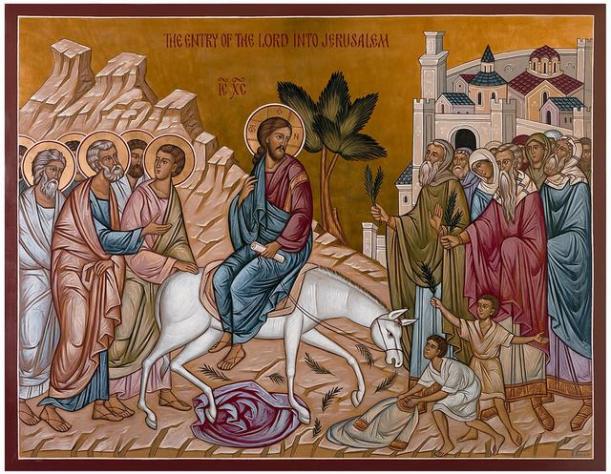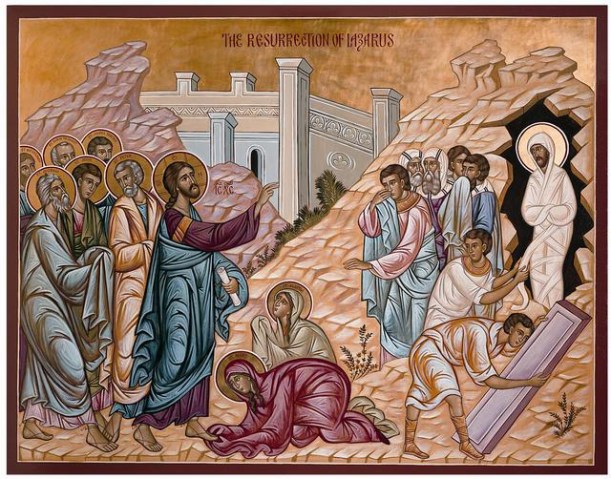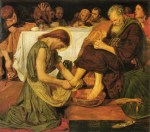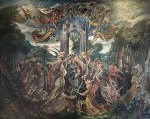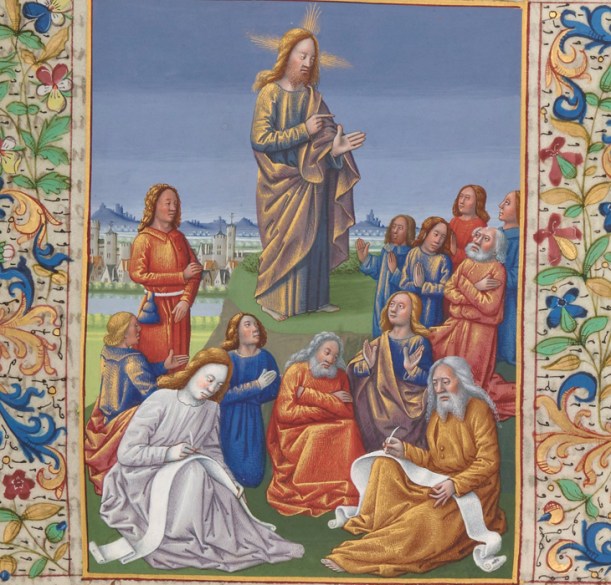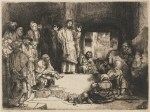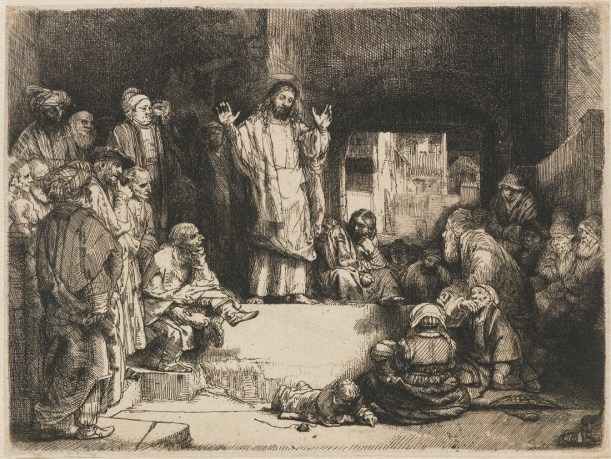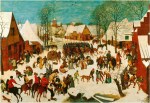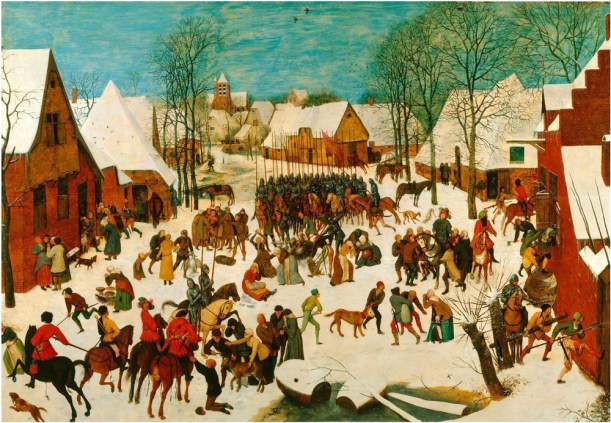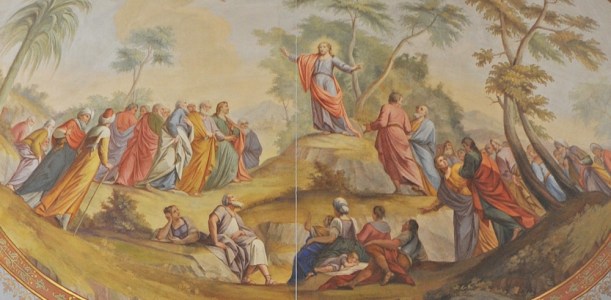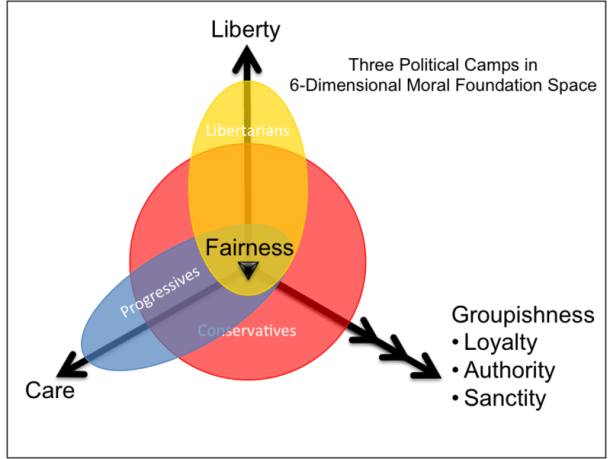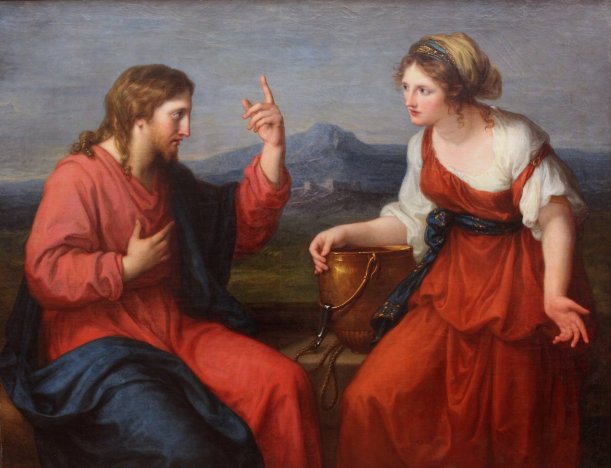
Christ and the Samaritan Woman at the Well, Angelika Kauffmann, 1796, oil on canvas, Neue Pinakothek, Munich.
Today I’m going to depart from the usual format of commenting on the Sunday readings and take up a question from a reader of my Facebook page. The question is this:
Why don’t Christians condemn the parts of their Bible that instruct non-believers must be killed. While they are at it they could do the same about the bits that condone rape and the bits that say gays must die.
Firstly, I’d like to thank Bill for asking the question, and say that I had similar questions when I first took up the Bible to read it cover-to-cover. But I found that the deeper I delved into Sacred Scripture, with the help of commentary from the best scholars, the more miraculous and life-changing the Bible became.
Today I will focus on the first part of Bill’s question, and I’ll take the second half next week.
With reference to ‘the parts of the Bible that instruct non-believers must be killed’, I’m not sure which particular passage Bill had in mind (sorry, Bill, I should have asked), but let’s take, for example, Deuteronomy 20:16-18:
But as regards the towns of those peoples whom the LORD your God is giving you as your heritage, you must not spare the life of any living thing. Instead you must lay them under the curse of destruction: Hittites, Amorites, Canaanites, Perizzites, Hivites and Jebusites, as the LORD your God has commanded, so that they may not teach you to do all the detestable things which they do to honour their gods: in doing these, you would sin against the LORD your God.
Sounds pretty violent? Here are some thoughts on how to interpret this:
We need to understand the context of the story in order to understand why it says what it says. This is not an instruction to us NOW to go out and lay anyone under a curse of destruction, and I have never encountered anyone suggesting such a thing (except non-believers telling Christians how violent the Bible is). The Bible spans at least 2,000 years of history, and the parts of the Bible which have the most violence occur early in the history of the Israelites. But still, it’s legitimate to ask, “Why is this violence there at all?”
- We don’t teach toddlers in the same way we teach adults, and neither does God.
The Bible is really a collection of books in different genres which trace the story of God’s revelation of Himself to mankind. Now it’s not an easy task to teach humans anything, so God, in his wisdom, decided to select one particular nation – the Jews – and lead them gradually by methods that they could understand, to a fuller knowledge of Himself. When we read Scripture, it helps to think of the question, “What is God trying to achieve?” He wants the Israelites to be in a Covenant relationship with him – as children to a loving Father – and he wants them to learn how to listen to him and live good and holy lives. It’s essential that we understand the covenantal love of the Father if we want to understand the Old Testament – God is creating a bond with creatures he wants to elevate to the level of family.
During the period described in the Deuteronomy passage above, the Jewish nation is still in its infancy. Like toddlers, they are having great difficulty learning to listen to the voice of God, their Father, who, like a good parent, knows what is best for them. By the time we get to this passage in Deuteronomy, we have seen numerous examples of the peaks and troughs of the Israelite journey. One minute they are trusting in God with wholehearted self-abandonment, and are rewarded with blessings, next minute they are a nation of grumblers and mutterers who forget God’s help during the good times and are now backing away and suspicious of God’s intentions. The Israelites have an unfortunate habit of thinking their own ideas are better than God’s.
The Israelites of this period are like spiritual toddlers, who are embedded in a culture that is not very nuanced or morally sophisticated, and so God has to achieve his purpose of returning them to the Promised Land by talking to them in the only language they can understand – the rather unsubtle Deuteronomic Law.
For more on this and how to understand the Bible generally, I would recommend reading Walking with God by Tim Gray and Jeff Cavins.
- Context is everything.
God had previously given peaceful instructions to Moses for re-entering the Promised Land (remember this is the land they had left about 500 years earlier, when they had relocated to Egypt during a famine), but they had failed to obey orders. What, specifically, were these directives?
Look, I am sending an angel to precede you, to guard you as you go and bring you to the place I have prepared … I shall send terror of myself ahead of you; I shall throw all the peoples you encounter into confusion, and make all your enemies take to their heels. I shall send hornets ahead of you to drive Hivite, Canaanite and Hittite out before you. I shall not drive them out ahead of you in a single year, or the land might become a desert where wild animals would multiply to your cost. I shall drive them out little by little before you, until your numbers grow sufficient for you to take possession of the land. (Exodus 23: 20, 27-31).
So this re-entry was meant to be accomplished without warfare, but merely through the Israelites trusting in God to drive the enemies of Israel out little by little as they were (a) thrown into confusion and (b) discomfited by something as relatively mild as an outbreak of hornets.
But, just when the Israelites were about to enter the Promised Land, they got cold feet! The reconnaissance party that had been sent out to assess the land, returned in fear, and their negative report caused the whole nation to waver and lose trust in God’s promise to be with them.
They began disparaging the country they had reconnoitred to the Israelites, saying, ‘The country we have been to reconnoitre is a country that devours its inhabitants. All the people we saw there were of enormous size. We saw giants there too … We felt like grasshoppers, and so we seemed to them’
The whole community then cried out in dismay, and the people wept all that night. All the Israelites muttered at Moses and Aaron, and the whole community said to them, ‘Would to God we had died in Egypt, or even that we had died in this desert!’ (Numbers 13:32-33, 14:1-2)
The consequence of the lack of fidelity shown by Israel, is that they have to wander in the wilderness for forty more years, before they can have another crack at the Promised Land.
Now this is where the book of Deuteronomy comes in (the violent passage quoted at the beginning). What we have to understand about Deuteronomy is that it’s not God’s first choice – the name itself means, “second law” (Deutero = second, nomos = law). The only law that is universal and continued into the New Covenant under Christ is the Decalogue (the Ten Commandments) – and the principles derived from it. Jesus himself gives a critique of Deuteronomic law when he talks about divorce in Matthew 19:8:
They said to him, ‘Then why did Moses command that a writ of dismissal should be given in cases of divorce?’ He said to them, ‘It was because you were so hard hearted, that Moses allowed you to divorce your wives, but it was not like this from the beginning. Now I say this to you: anyone who divorces his wife … and marries another, is guilty of adultery.’
Referring back to Deuteronomy 24:1, we can find out what ‘Moses’ command’ was.
Suppose a man has taken a wife and consummated the marriage; but she has not pleased him and he has found some impropriety of which to accuse her; he has therefore made out a writ of divorce for her and handed it to her and then dismissed her from his house; she leaves his home and goes away to become the wife of another man. Then suppose this second man who has married her takes a dislike to her and makes out a writ of divorce for her and hands it to her and dismisses her from his house or if this other man who took her as his wife dies, her first husband, who has repudiated her, may not take her back as his wife now that she has been made unclean in this way.
See how different Jesus’ version is from that of Moses’ Law? The Deuteronomic law was given for people whose hearts were already hardened to God. Therefore the teaching about killing the Hittites, Amorites, Canaanites, and any other recalcitrant tribes, is also a ‘limited edition’ instruction which falls away under the New Covenant.
- The spiritual danger of being infected by Canaanite culture.
But why does Moses say, “You must not spare the life of any living thing”? The reason that the Israelites must not contaminate themselves with Canaanite culture is made clear:
so that they may not teach you to do all the detestable things which they do to honour their gods: in doing these, you would sin against the LORD your God.
The thing that many people don’t appreciate is just how horrific and obscene the practices of the Canaanites were. Think of it from God’s point of view – for the Jews simply to blend in with these Canaanites would be like your conscientious, God-fearing and well-behaved son getting involved with a bunch of drug dealers and sex traffickers. Once his mind has been twisted by the wrong sort of friends, it will be very difficult for him to extricate himself. Similarly, if the Israelites start intermingling with the deplorable Canaanites, soon their close, distinctive and holy relationship with the one true God will be so diluted as to be unrecognisable.
So what sort of things did the Canaanites, Hittites, and the rest of them get up to?
- Idolatry: the Ancient Near East had a pantheon of ‘gods’– Ba’al, Anat, Dagon, Tanit, Asherah, Ishtar, to name a few. Unlike the God of the Israelites who is the single uncaused cause of all reality, these ‘gods’ were different in kind. They were no more than mythical creatures whose moral code ascended no higher than soap-opera levels. The Canaanite myth, El, Ashertu and the Storm-god (ANET, 519) illustrates this aspect.
The Storm-god [Baal] came to El-Kunirsha, the husband of Ashertu [Asherah], and entered El-Kunirsha’s tent … Thus said the Storm-god. “When I entered thy house, Ashertu sent out her maidens to me, saying, ‘Come, sleep with me.’ Ashertu is impugning thy virility. Although she is thy wife, she keeps on sending to me: ‘Come, sleep with me.’ El Kunirsha began to reply to the Storm-god: ‘Go sleep with her! Lie with my wife and humble her!’
- Incest: Not only does Ba’al have a sexual relationship with his sister, Anat, but also with his daughter, Pidray. And if the ‘gods’ can do this, what does that mean for the example they’re setting?
- Temple prostitution: the Canaanite religion included so-called sacred prostitution as part of their fertility rites – there were priestesses set aside for this, but it also affected the general population. Herodotus of Halicarnassus describes the Ancient Near East worship in the temple of Ishtar as follows:
There is one custom amongst these people which is wholly shameful: every woman who is a native of the country must once in her life go and sit in the temple of Ishtar [Venus] and there give herself to a strange man. The History of Herodotus, Book 1, 199.
- Bestiality: This deplorable practice seems to have been condoned by this description of Ba’al’s activities, amongst others. And if the gods can do this, what does this say about the humans that follow him?
Mightiest Ba’al obeyed.
He loved a heifer in the pasture,
A cow in the fields by the shore of the realm of death;
he did lie with her seven and seventy times,
she allowed him to mount eight and eighty times;
and she conceived and gave birth to a boy. (Baal and Mot 5, v, vi)
and worst of all,
- Child sacrifice: – both the Canaanites and the Phoenicians (who were related groups) practiced child sacrifice. Leviticus 18:21 describes the practices of the surrounding nations:
You will not allow any of your children to be sacrificed to Molech, thus profaning the name of your God.
Cleitarchus describes the Phoenician method of child sacrifice:
There stands in their midst a bronze statue of Kronos [the Phoenician equivalent of Moloch], its hands extended over a bronze brazier, the flames of which engulf the child. When the flames fall upon the body, the limbs contract and the open mouth seems almost to be laughing until the contracted body slips quietly into the brazier. Thus it is that the ‘grin’ is known as ‘sardonic laughter,’ since they die laughing.
The commentary in the Jerusalem Bible says, “In Canaanite ritual, children were sacrificed by being made to pass through fire, i.e. by burning … The rite found its way into Israel, notably at the burning-place in the valley of Ben-Hinnom (‘Gehenna’), just outside Jerusalem. The origin of the word Molech is Phoenician and designated a certain type of sacrifice.”
- Jesus is the ultimate reference point.
All Christians know that, whatever is said in the Old Testament, the fullest expression of the heart of God the Father is contained in Jesus Christ, the ‘icon of the invisible God’ (Col. 1:15). Jesus is the second person of the Trinity, the Word of God, who has assumed human nature and come to us to reveal the Father more fully. Therefore the definitive guide for Christian behaviour is seen in the New Testament and explained by the Church which Christ established on earth. The Church has clear teachings on the killing of others, grounded in Christ. If atheists don’t hear Christians proclaiming these teachings week after week, it’s probably because they’re not in Church or looking in the right place. In fact, today’s Gospel reading is perfect for illustrating Jesus’ method of approaching those who do not share Jewish beliefs.
- Nevertheless, Christians don’t condemn parts of the Bible
… because all Scripture has been written under the inspiration of the Holy Spirit and describes how God has revealed Himself to mankind over the course of at least 4,000 years. Without God’s preparation of the Jews described in the Old Testament period, without their strengthening as a distinctive race with a distinctive Covenant relationship with God, the teaching of Jesus would have been incomprehensible, and his many fulfilments of prophecy would have been invisible.
(See here: Prophecies fulfilled by Jesus Christ)
Bill, I hope this has answered at least the first part of your question. Stay tuned for next week, when I will tackle the second part.
Today’s readings:
Word format: Year A Lent 3rd Sunday 2017
Pdf format: Year A Lent 3rd Sunday 2017
